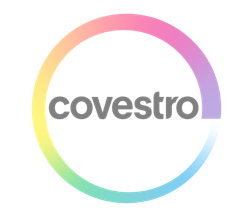• Greenhouse gas can be used in plastics manufacturing
• Covestro leads model program of the EU
New possibilities for utilizing the greenhouse gas carbon dioxi de are a topic at the UN Climate Change Conference. Related activities in industry, science and politics were presented at an accompanying event of the Paris Summit by Climate-KIC, a European Union initiative for climate innovations. Based on a model program named “enCO2re”, Climate-KIC wants to promote the partial replacement of increasingly scarce petroleum with carbon dioxide (CO2) in the plastics industry. The program is headed by materials manufacturer Covestro, a pioneer in the field.
Climate-KIC presented its model program and others on Friday evening at an event at the Grand Palais in Paris. Also in attendance were Mary Robinson, UN Special Envoy for Climate Change, and distinguished climate researcher Hans Joachim Schellnhuber, Chairman of the Governing Board of Climate-KIC.
 |
|
Covestro logo. (Image courtesy of Covestro) |
Utilization in foam, rubber and synthetic fibers
EnCO2re supports technological innovations, such as the possibility of using carbon dioxide in the future to manufacture rubber and synthetic fibers. A process developed by Covestro that produces raw materials for premium foams with this climate gas is already in the advanced stages. The company aims to launch industrial-scale manufacturing in 2016.
“The way of the future is to utilize CO2 to the fullest possible extent, so as to close the carbon cycle,” explained Dr. Markus Steilemann, member of the Covestro Board of Management responsible for innovation. “We are very pleased that governments are recognizing this fact and systematically promoting corresponding efforts in the business community and science – as Germany has been doing for quite some time and now also the EU. With its expertise in process and catalysis research, our company can and wants to advance activities in carbon dioxide utilization.”
An appeal to the business community, science, politics and society
Dr. Christoph Sievering, Head of Energy Policy at Covestro and Chairman of the enCO2re Steering Committee, emphasized the importance of interdisciplinary collaboration in this field. As an example, he mentioned that both leading industrial companies and six top research universities in Europe participate in the enCO2re program as research partners. “Beyond collaborations between industry and science, an active exchange with politics and society is necessary to successfully launch new CO2 technologies and demonstrate that industry can - and must - be part of the solution to the climate problem.”
One goal of enCO2re therefore is to increase the significance of this issue in the public eye. The Climate-KIC program further studies value chains in order to bring CO2 sources and suppliers together with potential users. Climate-KIC is one of several Knowledge and Innovation Communities set up by the European Institute of Innovation and Technology (EIT), and one of the largest European innovation initiatives for climate change mitigation and adaptation.












